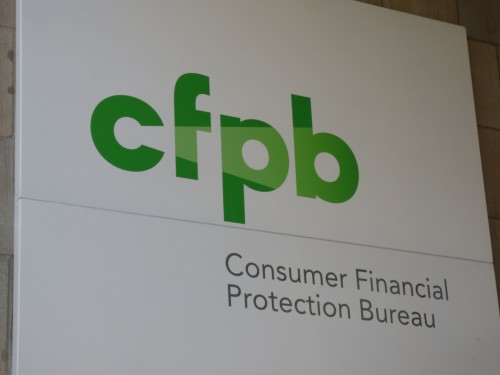(ThyBlackMan.com) Recent back-to-back financial enforcement actions taken by the Consumer Financial Protection Bureau (CFPB) underscore why the nation’s sole agency dedicated to consumer financial fairness retains broad and strong voter support.
On September 11, TD Bank, the nation’s 10th largest commercial bank with 1,200 branches and 2,600 ATMs in 15 states and the District of Columbia was ordered for the second time by CFPB to pay restitution to thousands of consumers for illegally tarnishing credit reports of tens of thousands consumers. It repeatedly provided consumer credit bureaus with inaccurate information on its customers about personal bankruptcies and credit card delinquencies. It also failed to properly investigate and resolve customer disputes linked to the faulty information. Given the widespread use of credit reports, the bank’s actions threatened customers’ ability to get a loan, job, or housing.

Under the terms of the recent order, the bank will return $7.76 million to its harmed consumers and pay a $20 million penalty as well.
“The CFPB’s investigation found that TD Bank illegally threatened the consumer reports of its customers with fraudulent information and then barely lifted a finger to fix it,” said CFPB Director Rohit Chopra. “Rather than treating its customers fairly and following the law, TD Bank’s management clearly cared more about growth and expanding its empire through mergers. Regulators will need to focus major attention on TD Bank to change its course.”
On the following day, September 12, CFPB ordered another repeat offender, Navient – formerly known as Sallie Mae – to pay more restitution and banned it from ever servicing student loans again. Under the terms of the order, Navient would have to pay $100 million to harmed borrowers, and a $20 million penalty.
The efforts to remove Navient from future student loan servicing followed several previous enforcement actions including:
- A 2014 $100 million joint order by the Department of Justice and the Federal Deposit Insurance Corporation for illegally overcharging nearly 78,000 military servicemembers;
- A 2021 order from the Department of Education to return more than $22 million in overcharges; and
- In 2022, a $1.85 billion settlement brought by 39 state attorneys general for originating predatory student loans in addition to its forbearance steering practices.
Consumer advocates also applauded the most recent Navient order.
“This is a step toward accountability and sends a powerful message to all student loan servicers that such behavior will not be condoned”, said Jaylon Herbin, director of federal campaigns at the Center for Responsible Lending (CRL). “For decades, Navient used deceptive tactics to steer borrowers into high-cost, long-term forbearances instead of placing them in affordable income-driven repayment (IDR) plans, leaving countless borrowers – many of whom were borrowers of color and low-income students – trapped in a cycle of debt.”
These and other actions that together demonstrate governmental support for financial fairness and are underscored in findings from a recent survey. Fresh data shows that voters of all or no political affiliations support the CFPB’s crack down on junk fees, discrimination, and other harmful actions from financial firms.
A bipartisan polling team from Lake Research Partners and Chesapeake Beach Consulting conducted the survey commissioned by Americans for Financial Reform (AFR) and CRL. Released on September 9, the survey showed:
- Nine in ten voters (91%) believe it is important to regulate financial services to ensure they are fair for consumers; this includes 95% of Democrats, 87% of Republicans, and 88% of independents;
- After reading information about overdraft fees, 84% of voters support limiting the price banks can charge to only what the overdraft costs them, with no additional profit; a majority support this policy strongly;
- 82% support the CFPB using all the tools available to hold financial companies accountable for discrimination in lending, with over three quarters in support across party lines;
- 82% of voters support government regulators capping credit card late fees at $8 per month, down from $32 per month; at least three quarters of voters across party lines are supportive, with at least half strongly supporting the cap; and
- After hearing a short description of the CFPB and its mission, four in five voters (81%) express support for the agency; favorability for the Consumer Bureau has been consistently very high over the past decade, ticking up slightly in 2020 and remaining at an elevated level.
“Whether the subject is credit card late fees, medical debt, or private equity’s growing impact in health care, voters favor tough regulation and oversight of the financial sector,” said Lisa Donner, executive director at Americans for Financial Reform.
“Voters of all political persuasions understand the need for the Consumer Bureau – a government watchdog that protects consumers from financial firms’ junk fees, illegal discrimination, and other misconduct,” said Mike Calhoun, president at the Center for Responsible Lending. “This poll reaffirms that politicians, regardless of their political affiliation, would best represent their constituents by supporting the Consumer Bureau and by keeping their hands off its funding structure.”
The survey has a range of additional questions, including on fintech, small business lending, and bank failures. To read the complete poll, visit: https://www.responsiblelending.org/research-publication/voters-strongly-support-consumer-bureaus-mission-across-political-spectrum.
Written by Charlene Crowell
Official website; http://twitter.com/charlenem2

















Leave a Reply